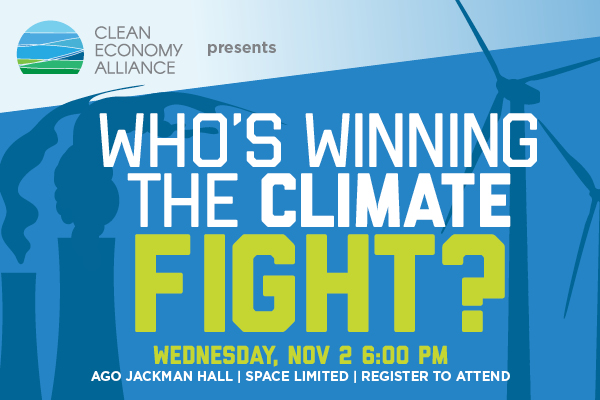A lot of progress is being made on the fight against climate change here in Canada and around the world. But is it enough? Are we winning the struggle for climate protection? And what more can people who care about this issue do to encourage greater progress?
These are big questions. And sadly, the answer to first two questions is “no.” On the last question — “what more can we do” — that’s a question I think about pretty much all the time. And it’s a question I want to invite you to explore with us on Wednesday, November 2 at a talk we’re hosting in Toronto with climate experts from B.C., California and Quebec.
Yes, climate change is finally getting the attention it deserves. After a decade of climate denial in Ottawa, Canada “is back.” The federal government signed the UN Paris agreement. That agreement has now been ratified by countries around the world, which means it’ll come into force sooner than expected.
In recent weeks, the federal government has announced that there will be a price on carbon across the country. And it promised other activities will be announced soon to shore up Canada’s efforts. Good news to be sure.
Provincial governments in Ontario, New Brunswick, Quebec and elsewhere are taking action too. And Alberta, home of Canada’s oil sands industry, is now rolling out its climate plan, which would have been unthinkable just a couple years ago.
Climate change is having its day. This is good news. And yet it’s not enough.
Canada’s targets are too weak, and Canada still doesn’t have a plan to meet even those weak targets. Alberta’s plan is truly a landmark, but questions remain about how the cap on oil sands emissions will be implemented, and how it will be accommodated within a national carbon budget.
B.C. — once a climate leader — has lost its leadership position and ignored the recommendations from the government-appointed climate leadership team. And in Ontario, the government released a comprehensive climate plan, but it is backsliding in places too — backing away from a firm commitment to net-zero homes, suspending renewable energy contracts, and the province is offering nice incentives for electric cars but they aren’t placing any requirements on manufactures or dealerships to makes sure those incentives translate into sales.
The public is onside with governments taking action. Polls consistently show broad public support for carbon pricing. Polling in Ontario shows 80 per cent of Ontarians want to see more renewable energy, not less. So what’s holding government back? And what can we do to help government be more ambitious?
These are the questions we’ll be digging into on Wednesday. Experts from B.C., California and Quebec will join us and share stories from their jurisdictions and we’ll discuss how they relate to Ontario and to federal action.
California just passed new climate legislation, and we’ll hear from a lead campaigner at the Union of Concerned Scientists about how that law was passed, where the opposition came from, and how civil society helped California continue its legacy of climate leadership.
We’ll hear from Tzeporah Berman about the dynamic in B.C., the first jurisdiction in North America to put a price on carbon, but a province that has done little since. Emissions in B.C. are on the rise once again, and the province’s leadership has been ceded.
And we’ll hear from Steven Guilbeault of Équiterre, Quebec’s leading environmental organization, about what’s happening in Quebec, where progress seems to be slow and steady.
The question “are we winning the fight?” is a complex one. On the one hand, we are winning. And yet, it’s not enough.
Join us, and the Clean Economy Alliance to find out what we can learn from the experiences of other jurisdictions — and to help answer the question of what more can we, as citizens and members of civil society, do to help government go further?
We are winning, but it’s not enough. Let’s put our minds to how we can help governments go further, faster.
Like this article? Please chip in to keep stories like these coming.




